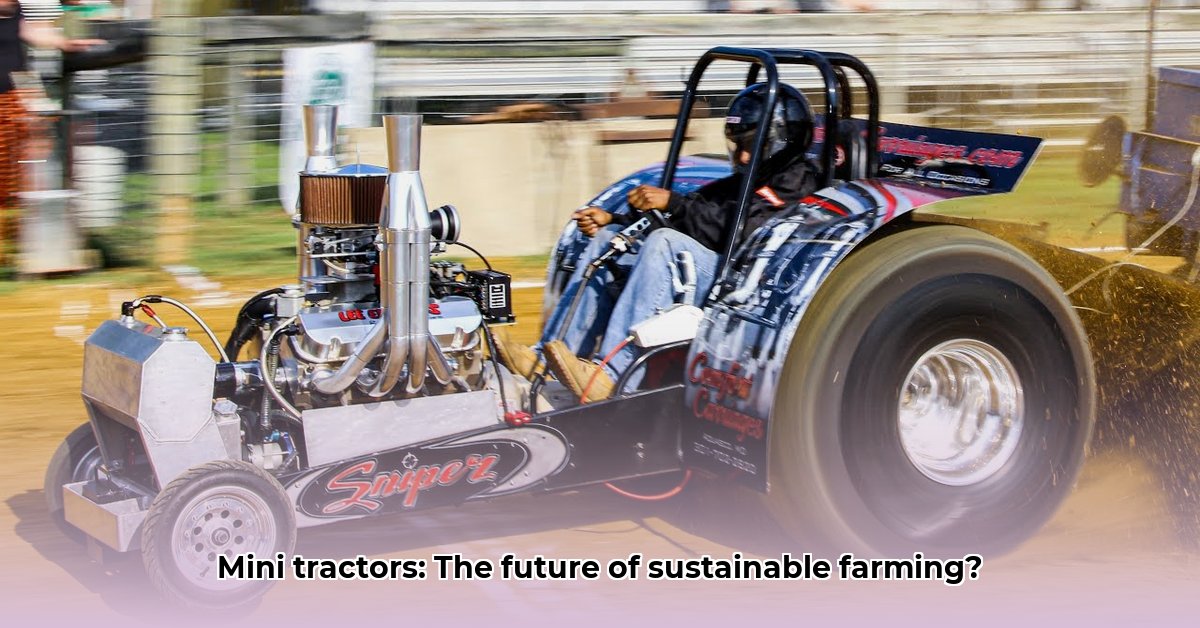
Mini Rod Tractor Pulling: A Surprisingly Green Future?
Mini rod tractor pulling, a popular spectacle featuring miniature tractors competing for power and speed, may seem unrelated to sustainable agriculture. However, a potential, yet currently unproven, connection exists. This article explores the possibility of integrating sustainable agriculture practices into these events, focusing on community engagement and future research needed to validate this potential. We examine what we currently know, what we need to discover, and actionable steps to explore this intriguing possibility. For more local events, check out tractor pulls near you.
The Current Landscape: What We Know (and Don't Know)
Currently, evidence directly linking mini rod tractor pulling to sustainable farming practices is scarce. The Texas Minirod Tractor Pullers Association (TMTPA), a major player in this hobby, primarily focuses on competition and community building. While these events foster social connections in rural areas, there is no documented direct promotion of environmentally conscious farming methods. Concrete data demonstrating a positive impact on sustainable agriculture is lacking. This absence of evidence, however, doesn't negate the potential; it simply highlights the need for thorough investigation.
Untapped Potential: Community Building and Beyond
The significant potential lies in the existing community engagement already inherent in mini rod tractor pulling events. These events draw substantial crowds in rural areas, providing a built-in audience for promoting sustainable agriculture. Imagine incorporating workshops on soil health, water conservation techniques, or showcasing innovative farming technologies. This creates a unique opportunity to engage farmers, enthusiasts, families—anyone interested in learning about environmentally responsible practices. This pre-existing community enthusiasm could be effectively channeled towards a shared sustainable goal.
From Hobby to Hotspot: Outreach and Education
Envision mini rod tractor pulling events transforming into platforms for showcasing energy-efficient farm equipment or renewable energy solutions. Attendees could witness demonstrations of cutting-edge technologies enhancing sustainability. Farmers could share successful sustainable farming practices, inspiring their peers. Manufacturers could exhibit eco-friendly machinery, demonstrating how technology contributes to a greener approach. This integrates learning seamlessly into entertainment, making information more accessible and engaging for a wider audience.
The Research Roadmap: Uncovering the Truth
To accurately gauge the potential link between mini rod tractor pulling and sustainable agriculture, robust research is crucial. This involves collecting empirical evidence, not relying on assumptions:
Surveys: Gather data on the demographics of those involved in mini rod tractor pulling and their attitudes towards sustainable farming practices. This will determine if there’s a shared interest that can be leveraged.
Interviews: Conduct in-depth conversations with TMTPA members, event organizers, and local farmers to gather qualitative data and understand their perspectives and experiences. This will illuminate existing barriers and opportunities.
Case Studies: Analyze successful community engagement models focusing on sustainable agriculture. This will provide a framework for adapting these models to the context of mini rod tractor pulling events.
Longitudinal Studies: Track the impact of mini rod tractor pulling events over an extended period (several years) to determine if they lead to measurable changes in local farming practices. This is essential for demonstrating real-world effects.
Actionable Steps: A Collaborative Effort
Realizing the full potential requires collaboration among various stakeholders. Here’s a suggested framework for short-term and long-term actions:
| Stakeholder | Short-Term Actions (0-1 year) | Long-Term Actions (3-5 years) |
|---|---|---|
| Agricultural Communities | Conduct community needs assessments to identify gaps in sustainable agriculture knowledge and resources. | Implement pilot programs integrating sustainable agriculture education into mini rod tractor pulling events; evaluate effectiveness. |
| Researchers | Design and implement surveys and interviews to explore the correlation between mini rod tractor pulling and sustainable agriculture adoption. | Publish research findings widely; disseminate to farmers, policymakers, and the broader scientific community. |
| Government Agencies | Explore funding opportunities for research projects and pilot programs focused on this potential connection. | Develop policy incentives encouraging the integration of sustainable agriculture messaging into mini rod tractor pulling events. |
| TMTPA | Incorporate workshops, demonstrations, or educational booths on sustainable agriculture practices into existing events. | Develop partnerships with agricultural organizations and research institutions to enhance the environmental sustainability of their events. |
The Road Ahead: A Promising Partnership
The link between mini rod tractor pulling and sustainable agriculture remains largely unproven. However, the potential for a mutually beneficial partnership is significant. With focused research and collaborative action, we can determine if this unique combination can contribute to a more sustainable agricultural future. The opportunity is present; now we must cultivate it through dedicated research and collaborative effort.